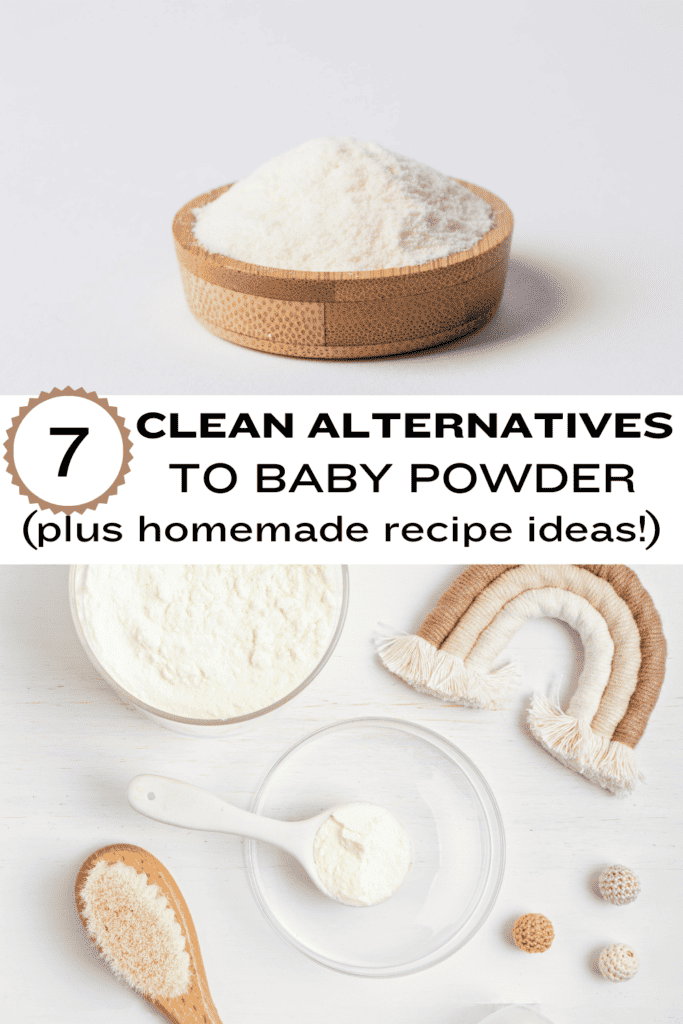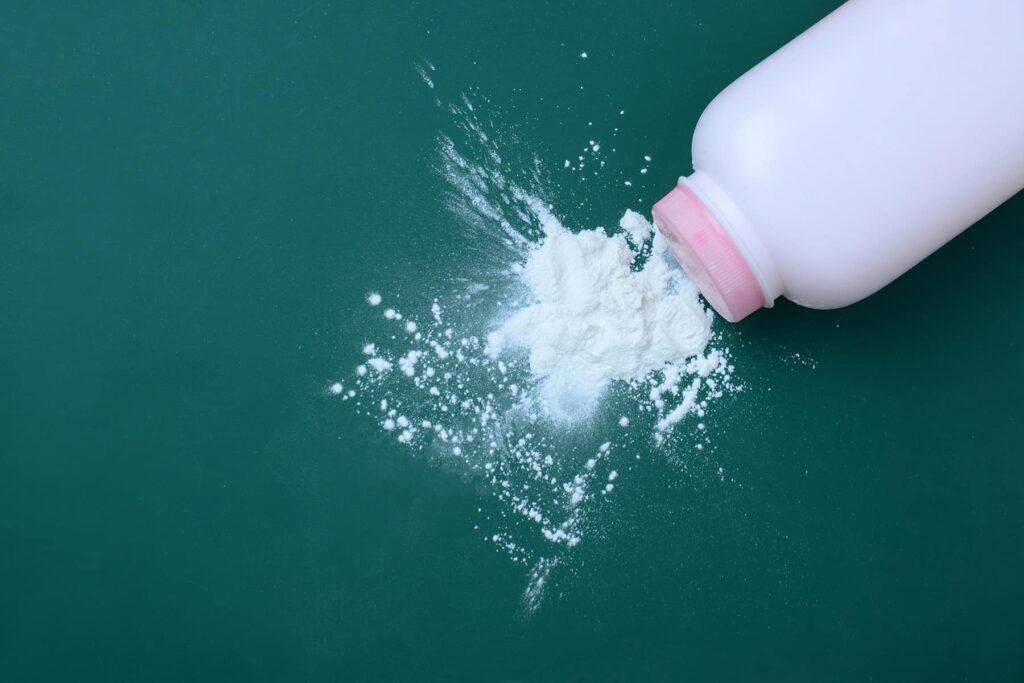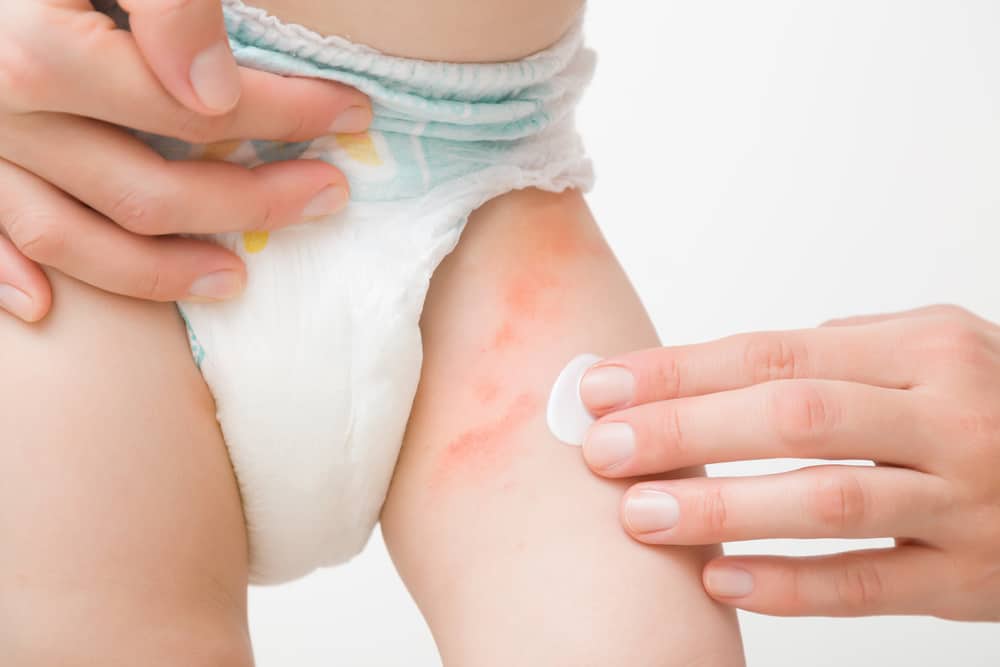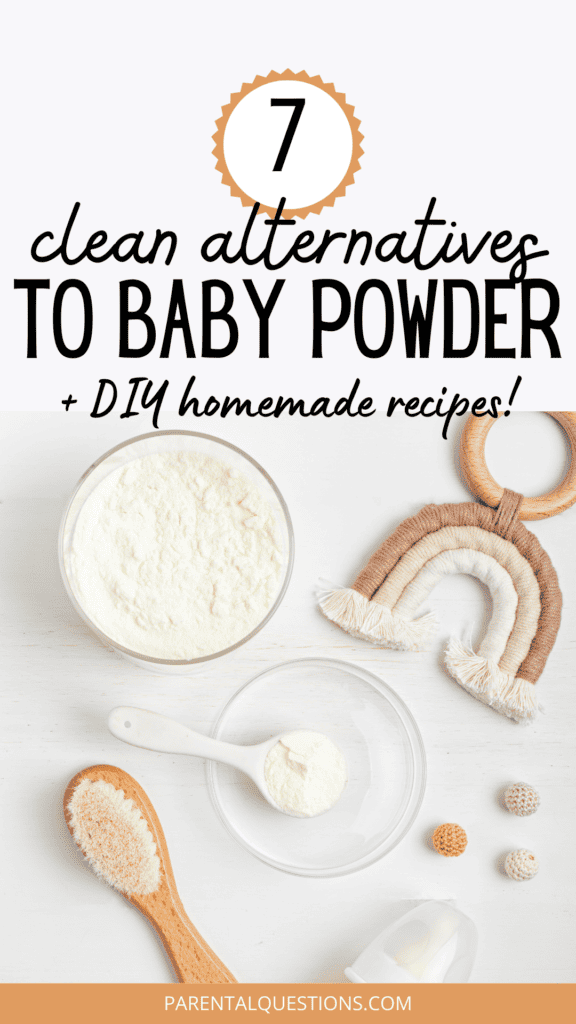Baby powder has been a staple in many households for decades. However, recent studies have shown that talcum powder, a common ingredient in baby powder, may pose health risks. As a result, many parents are searching for safe and natural alternatives to baby powder.
Understanding the Dangers of Baby Powder Talcum powder, a key ingredient in many baby powders, has been linked to ovarian cancer and respiratory problems. In 2020, Johnson & Johnson announced that it would stop selling talc-based baby powder in the US and Canada due to the mounting lawsuits against the company. While talcum powder is not banned, many parents are understandably concerned about the potential health risks.
pin it!

Why Switch to Baby Powder Alternatives Given the potential dangers of talcum powder, it’s no surprise that many parents are looking for safer alternatives to baby powder. Fortunately, there are several natural and safe alternatives that can be used to help keep babies dry and comfortable. From cornstarch to arrowroot powder, there are many options to choose from.
Key Takeaways
- Talcum powder, a common ingredient in baby powder, has been linked to health risks such as ovarian cancer and respiratory problems.
- Many parents are looking for natural and safe alternatives to baby powder.
- Cornstarch and arrowroot powder are just a few of the many options available as baby powder alternatives.
Understanding the Dangers of Baby Powder

The Talc and Asbestos Connection
Talcum powder is made from talc, a mineral that is composed of magnesium, silicon, and oxygen. Talc is commonly used in cosmetic products, including baby powder, because of its ability to absorb moisture and reduce friction.
However, talc can sometimes be contaminated with asbestos, a naturally occurring mineral that is known to cause cancer. Asbestos is a carcinogen that can cause mesothelioma, a rare and deadly cancer that affects the lining of the lungs, abdomen, or heart.
In the past, some talcum powder products contained asbestos, and this has led to concerns about the safety of using baby powder. Although most talcum powder products are now asbestos-free, there is still a risk of contamination, especially if the talc is not properly mined and processed.
Potential Health Risks
The use of talcum powder has been linked to several health problems, including ovarian cancer, respiratory problems, and lung damage. Some studies have suggested that using talcum powder in the genital area may increase the risk of ovarian cancer in women.
In 2019, the FDA found that some talcum powder products contained cancer-causing asbestos, leading to a recall of certain products. The World Health Organization has also classified talc as a possible carcinogen.
Despite these concerns, many manufacturers, including Johnson & Johnson, continue to sell talcum powder products. It is important for consumers to be aware of the potential risks and to use alternative products when possible.
When it comes to baby powder, there are several safe and effective alternatives available, including cornstarch, arrowroot powder, and baking soda. These products can help to absorb moisture and reduce friction without the potential health risks associated with talcum powder.
Why Switch to Baby Powder Alternatives
Parents have been using baby powder for decades to keep their baby’s skin dry and rash-free. However, recent studies have shown that baby powder may not be as safe as once thought. In this section, we will explore the reasons why parents should consider switching to baby powder alternatives.

Skin Sensitivity and Irritation
One of the main reasons to switch to baby powder alternatives is the risk of skin sensitivity and irritation. Baby powder contains talc, which has been linked to skin irritation, rashes, and even cancer. Sensitive skin can be particularly prone to irritation from talc-based baby powder.
Instead of using baby powder, parents can consider using cornstarch-based powders or creams that are specifically designed for sensitive skin. These alternatives are gentler on the skin and less likely to cause irritation or rashes.
Respiratory Issues and Inhalation
Another reason to switch to baby powder alternatives is the risk of respiratory issues and inhalation. When baby powder is applied, it can become airborne and inhaled by both the baby and the parent. Inhaling talc-based baby powder can cause respiratory issues, such as coughing, wheezing, and even asthma.
To avoid these risks, parents can consider using alternative products such as lotion or oil. These products are less likely to become airborne and are safer for both the baby and the parent.
In conclusion, parents should consider switching to baby powder alternatives to reduce the risk of skin sensitivity, irritation, and respiratory issues. By using alternative products such as cornstarch-based powders or creams, parents can keep their baby’s skin dry and rash-free while also ensuring their safety and well-being.
Natural and Safe Alternatives to Baby Powder
Cornstarch-Based Powders
Cornstarch is a popular alternative to talcum powder. It is a natural and safe alternative that can help absorb moisture and soothe irritated skin. Cornstarch-based powders are easy to find and are often sold in baby powder form. Cornstarch is also a great alternative for those with sensitive skin.
Arrowroot and Tapioca Starch Powders
Arrowroot powder and tapioca starch are both natural and safe alternatives to talcum powder. These powders can help absorb moisture and soothe irritated skin. Arrowroot powder is often used in natural skincare products and is gentle on the skin. Tapioca starch is also a great alternative for those with sensitive skin.
Baking Soda and Kaolin Clay Powders
Baking soda and kaolin clay are both natural and safe alternatives to talcum powder. Baking soda can help absorb moisture and neutralize odors. Kaolin clay is a gentle, natural clay that can help soothe irritated skin. These powders can be used alone or in combination with other powders.
Oat Flour and Rice Starch Powders
Oat flour and rice starch are both natural and safe alternatives to talcum powder. Oat flour is gentle on the skin and can help soothe irritated skin. Rice starch is a great alternative for those with sensitive skin. These powders can be used alone or in combination with other powders.
When using natural powders as an alternative to baby powder, it is important to remember to use in moderation and avoid inhaling the powder. It is also important to check the ingredients and ensure that there are no allergies or sensitivities.
Additional Safe Practices for Baby Skin Care
When it comes to caring for a baby’s delicate skin, it is important to take extra precautions to prevent irritation and discomfort. In addition to avoiding the use of baby powder, there are several other safe practices that parents can follow to maintain the health of their baby’s skin.

Use of Diaper Creams and Lotions
One way to prevent diaper rash and other skin irritations is to use diaper creams and lotions. These products can help soothe and protect the skin, creating a barrier between the diaper and the baby’s delicate skin.
When choosing a diaper cream or lotion, it is important to look for products that contain zinc oxide or paste. These ingredients can help protect the skin and promote healing if a rash does develop. It is also important to choose products that are labeled as “ointment” or “cream,” rather than “lotion,” as these tend to be more effective at creating a protective barrier.
Parents should apply diaper cream or lotion at every diaper change, making sure to cover the entire diaper area. Be sure to clean and dry the area thoroughly before applying the cream or lotion.
Proper Diaper Changing and Cleaning Techniques
In addition to using diaper creams and lotions, parents should also follow proper diaper changing and cleaning techniques to prevent skin irritation. This includes:
- Changing diapers frequently to prevent prolonged exposure to moisture and bacteria.
- Using gentle wipes or a clean, damp cloth to clean the diaper area. Avoid using harsh soaps or alcohol-based wipes, as these can be irritating to the skin.
- Patting the area dry with a clean towel or cloth. Avoid rubbing the skin, as this can cause irritation.
- Allowing the skin to air dry for a few minutes before putting on a new diaper.
- Using a protective barrier, such as petroleum jelly or a diaper cream, to help prevent moisture from coming into contact with the skin.
By following these safe practices, parents can help prevent diaper rash and other skin irritations in their baby’s delicate skin.
Homemade Baby Powder Alternatives
Parents are often looking for natural and safe alternatives to commercial baby powders that may contain harmful chemicals. Making homemade baby powder is a simple and cost-effective solution. Here are two easy DIY baby powder alternatives that can be made at home.

DIY Cornstarch and Arrowroot Powder Mix
Cornstarch and arrowroot powder are widely used in homemade baby powder recipes. They are both natural and safe ingredients that can help absorb moisture and soothe the skin.
To make a simple DIY cornstarch and arrowroot powder mix, combine equal parts of cornstarch and arrowroot powder in a bowl. Mix well and store the powder in a clean container with a tight-fitting lid.
Parents can also add a few drops of their favorite essential oil to the powder for a pleasant scent. However, it is important to note that some essential oils may cause skin irritation, so it is best to do a patch test before using them on a baby’s skin.
Homemade Oat Flour Blend
Oat flour is another natural and gentle ingredient that can be used in homemade baby powder. It is rich in vitamins and minerals and can help soothe irritated skin.
To make a homemade oat flour blend, grind rolled oats in a food processor until they turn into a fine powder. Mix the oat flour with a small amount of baking soda to help absorb moisture and prevent odors.
Parents can also add a few drops of essential oil to the powder for a pleasant scent. However, it is important to note that some essential oils may cause skin irritation, so it is best to do a patch test before using them on a baby’s skin.
In conclusion, making homemade baby powder is a safe and easy alternative to commercial baby powders. Parents can use natural ingredients like cornstarch, arrowroot powder, and oat flour to help absorb moisture and soothe their baby’s skin. It is important to do a patch test before using any new product on a baby’s delicate skin.
Other Uses of Baby Powder Alternatives
As a Dry Shampoo
Dry shampoo is a type of hair product that helps to absorb excess oil and dirt from the scalp and hair. It is a great alternative to baby powder for people who want to keep their hair clean without using water. Some of the best alternatives to baby powder as a dry shampoo include:
- Cornstarch: Cornstarch is a great alternative to baby powder as a dry shampoo. It helps to absorb excess oil and dirt from the scalp and hair, leaving it clean and refreshed.
- Baking soda: Baking soda is another great alternative to baby powder as a dry shampoo. It helps to absorb oil and dirt from the scalp and hair, leaving it clean and refreshed.
- Oatmeal: Oatmeal is also a great alternative to baby powder as a dry shampoo. It helps to absorb excess oil and dirt from the scalp and hair, leaving it clean and refreshed.
In Makeup and Foundation
Baby powder is often used as a setting powder for makeup and foundation. However, there are many alternatives to baby powder that can be used for this purpose. Some of the best alternatives include:
- Cornstarch: Cornstarch is a great alternative to baby powder as a setting powder for makeup and foundation. It helps to absorb excess oil and sweat, leaving the skin looking matte and fresh.
- Arrowroot powder: Arrowroot powder is another great alternative to baby powder as a setting powder for makeup and foundation. It helps to absorb excess oil and sweat, leaving the skin looking matte and fresh.
- Rice powder: Rice powder is also a great alternative to baby powder as a setting powder for makeup and foundation. It helps to absorb excess oil and sweat, leaving the skin looking matte and fresh.
pin it!

Overall, there are many alternatives to baby powder that can be used for a variety of purposes. These alternatives are often more natural and healthier than baby powder, and can be just as effective.
Related Post: How to Brush Doll Hair
Frequently Asked Questions
What are some talc-free alternatives to baby powder?
Talc-free alternatives to baby powder include cornstarch, arrowroot powder, and baking soda. These powders are safe and effective in absorbing moisture and preventing chafing.
What is the safest powder for feminine hygiene?
The safest powder for feminine hygiene is one that is free of talc and fragrances. Cornstarch or arrowroot powder are good alternatives that can help absorb moisture and prevent odor.
Can cornstarch be used as a substitute for baby powder?
Yes, cornstarch can be used as a substitute for baby powder. It is a natural and safe alternative that can help absorb moisture and prevent chafing.
Is baking soda a safe alternative to baby powder?
Baking soda can be used as an alternative to baby powder, but it is important to use it sparingly as it can be abrasive and cause irritation. It is best to mix it with cornstarch or arrowroot powder to make it less harsh.
What are some natural alternatives to baby powder?
Some natural alternatives to baby powder include oat flour, rice flour, and kaolin clay. These powders are safe and effective in absorbing moisture and preventing chafing.
Are there any risks associated with using baby powder?
Using baby powder that contains talc can increase the risk of ovarian cancer and respiratory problems. It is important to use talc-free alternatives to avoid these risks. Additionally, it is important to use powders sparingly and avoid applying them directly to the genital area.
Related Post: What To Put In A Baby Shower Gift Basket?

Iesha is a loving mother of 2 beautiful children. She’s an active parent who enjoys indoor and outdoor adventures with her family. Her mission is to share practical and realistic parenting advice to help the parenting community becoming stronger.
